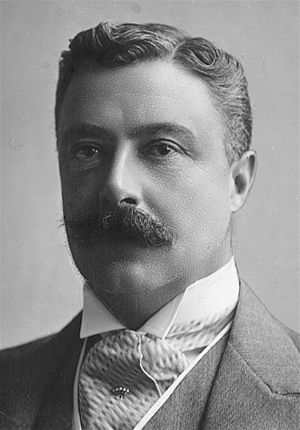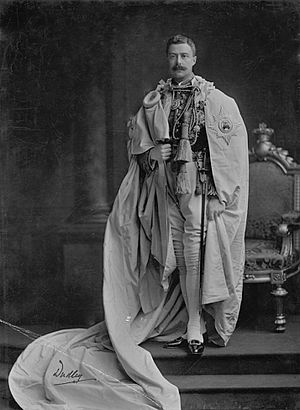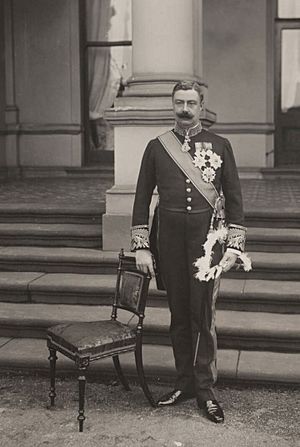William Ward, 2nd Earl of Dudley facts for kids
Quick facts for kids
The Earl of Dudley
|
|
|---|---|

Ward c. 1900s
|
|
| 4th Governor-General of Australia | |
| In office 9 September 1908 – 31 July 1911 |
|
| Monarch | Edward VII George V |
| Prime Minister | Alfred Deakin Andrew Fisher |
| Preceded by | Lord Northcote |
| Succeeded by | Lord Denman |
| Lord Lieutenant of Ireland | |
| In office 11 August 1902 – 11 December 1905 |
|
| Monarch | Edward VII |
| Prime Minister | Arthur Balfour |
| Preceded by | Lord Cadogan |
| Succeeded by | Lord Aberdeen |
| Personal details | |
| Born | 25 May 1867 London, England |
| Died | 29 June 1932 (aged 65) London, England |
| Political party | Conservative |
| Spouses |
Rachel Gurney
(m. 1891; died 1920)Gertie Millar
(m. 1924) |
| Children | 7 |
| Parents | William Ward, 1st Earl of Dudley Georgina Moncrieff |
| Education | Eton College |
William Humble Ward, the 2nd Earl of Dudley (born May 25, 1867 – died June 29, 1932), was an important British figure. He was an aristocrat, meaning he came from a noble family. He also worked as a politician and a military officer.
He is best known for being the fourth Governor-General of Australia. This was a very important job, and he held it from 1908 to 1911. Before that, he was the Lord Lieutenant of Ireland from 1902 to 1905. He also served as a government minister.
Contents
Early Life and Education
William Ward was born in London, England. His father was William Ward, the 1st Earl of Dudley. His mother was Georgina, daughter of Sir Thomas Moncrieff.
He went to a famous school called Eton. When he was 17, his father passed away. William then became the 2nd Earl of Dudley. He inherited a lot of land and money. This included mineral deposits and many coal and iron mines. He also got a grand family home called Witley Court.
In 1886–87, he visited Australia on a yachting trip. He became friends with the Prince of Wales, who later became King Edward VII. The Prince of Wales even attended William's wedding in 1891.
His Time in the Military
William Ward joined the army when he was young. He became a lieutenant in the Queen's Own Worcestershire Hussars in 1885. He was promoted to captain and then major.
During the Second Boer War in South Africa, he served with the Imperial Yeomanry. He was involved in several battles. These included actions in the Orange Free State and Transvaal. He later helped with issues in Belfast, Ireland.
In 1913, he took command of the Worcestershire Hussars. He believed a war in Europe was coming. So, he trained his regiment well.
When World War I started in 1914, his regiment went to Egypt. They later fought as infantry in the Gallipoli campaign. They supported the Anzacs in a difficult battle. William left the regiment during this time. He later served with the headquarters staff of the 40th Division. He retired from the army as a lieutenant-colonel.
Important Roles in Government
William Ward was a member of the Conservative Party. He served in the House of Lords, which is part of the British Parliament. From 1895 to 1902, he was a government minister. He worked as the Parliamentary Secretary to the Board of Trade.
In 1902, he became the Lord Lieutenant of Ireland. This was a very important role. He was also made the Grand Master of the Order of St. Patrick. He was known for spending a lot of money in this role. However, he also showed good political and administrative skills. He helped with important laws about land in Ireland. He also worked on plans to give Ireland more self-governance.
Governor-General of Australia
In 1908, King Edward VII suggested William Ward for the role of Governor-General of Australia. This was a surprise because a different political party was in power. However, the Prime Minister agreed.
William arrived in Sydney on September 9, 1908. He quickly gained a reputation for being very grand and extravagant. Many Australians did not like this, especially the Labor Party. He had to work with a Labor government led by Andrew Fisher. This made his fancy style a big problem.
He also got involved in a political argument. He supported a campaign to build ships for the Royal Navy. This was against the Labor Party's plan for an independent Australian navy. This caused tension with Prime Minister Fisher.
Later, the Liberal Party came to power under Alfred Deakin. This solved some of William's problems. But he was still seen as "anti-Labor." This made him unpopular with many Australians.
In 1910, the Labor Party won the election. Andrew Fisher became Prime Minister again. Relations between William and Fisher became difficult. William insisted on keeping two expensive Government Houses. He also traveled around the country in a very grand way. He even rented a steam yacht to sail around Australia. Fisher, who was a frugal socialist, was very annoyed by this.
By October, William realized his position was impossible. He asked to be recalled to England. He left Australia on July 31, 1911. There was no official ceremony when he left.
Yachting and Hobbies
William Ward loved yachting. In 1885-1886, he went on a round-the-world cruise on his steam yacht, the Marchesa. During this trip, he met the Emperor of Brazil. He also stopped in Sydney for repairs.
He owned several racing yachts. He was a member of several sailing clubs. These included the Dublin Bay and Lough Erne sailing clubs. He was also part of the Royal Yacht Squadron.
Family Life
Lord Dudley married Rachel Anne Gurney in 1891. They had seven children together:
- Lady Gladys Honor Ward (born 1892)
- William Humble Eric Ward, 3rd Earl of Dudley (born 1894)
- Lady Morvyth Lillian Ward (born 1896)
- Hon Roderick John Ward (born 1902)
- Lady Alexandra Patrica Ward (born 1904)
- Hon Edward Frederick Ward (born 1907)
- George Reginald Ward, 1st Viscount Ward of Witley (born 1907)
Lady Dudley was interested in helping people with medical care. In Ireland, she started the Lady Dudley Nurses scheme in 1903. This helped isolated rural communities. In Australia, she started a similar program in 1908. This was an early version of the Flying Doctor service. During World War I, she set up the Australian Voluntary Hospital in London. Sadly, she drowned in 1920.
Lord Dudley married again in 1924. His second wife was the actress Gertie Millar.
William Ward died of cancer in London in 1932, at age 65. His oldest son, William, became the 3rd Earl of Dudley.
Honours and Awards
William Ward received many honours and awards during his life. These show his important roles and service.
- Grand Master of The Most Illustrious Order of Saint Patrick
- Knight Grand Cross of the Most Honourable Order of the Bath (GCB)
- Knight Grand Cross of the Order of St Michael and St George (GCMG)
- Knight Grand Cross of the Royal Victorian Order (GCVO)
- Knight's badge of the Most Venerable Order of the Hospital of Saint John of Jerusalem
- Territorial Decoration
- Queen Victoria's Diamond Jubilee Medal
- King Edward VII Coronation Medal
- King George V Coronation Medal
- Queen's South Africa Medal (with 5 clasps for battles)
Images for kids
-
Second wife: Gertie Millar, widow of Lionel Monckton




